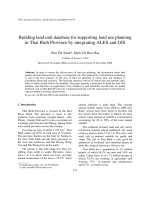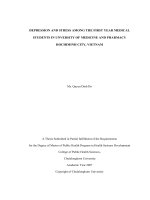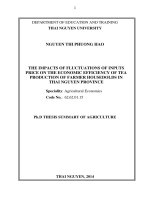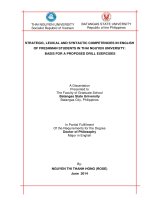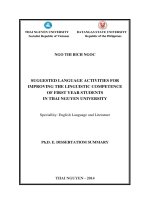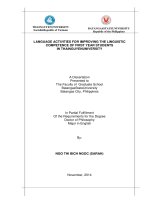Workbook on english language micro skills for first year college students in selected universities in thai nguyen province vietnam
Bạn đang xem bản rút gọn của tài liệu. Xem và tải ngay bản đầy đủ của tài liệu tại đây (12.9 MB, 230 trang )
i
THAI NGUYEN UNIVERSITY
Socialist Republic of Vietnam
BATANGAS STATE UNIVERSITY
Republic of the Philippines
WORKBOOK ON ENGLISH LANGUAGE MICRO-SKILLS FOR FIRST
YEAR COLLEGE STUDENTS IN SELECTED UNIVERSITIES
IN THAI NGUYEN PROVINCE, VIETNAM
A Dissertation
Presented to
The Faculty of Graduate School
Batangas State University
Batangas City, Philippines
In Partial Fulfillment
Of the Requirements for the Degree
Of Doctor of Philosophy
Major in English
By:
DANG THI THU HUONG
June 2015
ii
THAI NGUYEN UNIVERSITY
Socialist Republic of Vietnam
BATANGAS STATE UNIVERSITY
Republic of the Philippines
APPROVAL SHEET
This dissertation entitled “WORKBOOK ON ENGLISH LANGUAGE
MICRO-SKILLS FOR FIRST YEAR COLLEGE STUDENTS IN SELECTED
UNIVERSITIES IN THAI NGUYEN PROVINCE, VIETNAM” prepared and
submitted by DANG THI THU HUONG in partial fulfillment of the requirements
for the degree of Doctor of Philosophy major in English has been examined
and is recommended for Oral Examination.
MATILDA H. DIMAANO, Ph.D.
Adviser
PANEL OF EXAMINERS
Approved by the committee on Oral Examination with a grade
of _________.
DR. AMADA G. BANAAG
Chairman
DR. MARIA LUISA A. VALDEZ
Member
DR. FELIX M. PANOPIO
Member
DR. MYRNA G. SULIT
External Representative
Accepted and approved in partial fulfillment of the requirements for the
degree of Doctor of Philosophy major in English.
Comprehensive Examination: PASSED
_____________
Date
MATILDA H. DIMAANO, Ph.D.
Dean, Graduate Studies
College of Arts and Sciences
iii
THAI NGUYEN UNIVERSITY
Socialist Republic of Vietnam
BATANGAS STATE UNIVERSITY
Republic of the Philippines
ABSTRACT
Title
: Workbook on English Language Micro-skill for First Year
College Students in Selected Universities in Thai Nguyen
Province, Vietnam
Author
: Dang Thi Thu Huong
Course
: Doctor of Philosophy
Major
: English
Year
: 2015
Adviser
: Dr. Matilda H. Dimaano
Summary
The study was conducted to assess the English language micro- skill
needs of first year college students in selected universities in Thai Nguyen
Province, Vietnam. It covered the level of English language proficiency among
students in the four modes of language performance in reading, writing,
speaking and listening. The faculty also assessed the students English micro
skills relative to motor-perceptual skills for spoken and written media,
intonation skills concerned with understanding and conveying meaning
especially attitudinal meaning, deductive skills: deducing meaning or use of
unfamiliar lexical items such as reducing recourse to use of dictionary,
perceptual or communicative skills, conceptual skills: understanding and
expressing conceptual meaning, intrasentencial structure and semantic
iv
THAI NGUYEN UNIVERSITY
Socialist Republic of Vietnam
BATANGAS STATE UNIVERSITY
Republic of the Philippines
relations skills, discourse coherence skills and information transfer skills.
This study also determined which among the four modes of language
performance the students find most difficult and which among the English
micro skills students find difficult as assessed by faculty respondents. The
output of the study is a proposed supplementary workbook to enhance the
students micro skill needs.
The study covered the four (4) Thai Nguyen Universities in Thai Nguyen
Province with three hundred eighty (380) freshman students and 53 English
language teachers as respondents of the study. It made use of descriptive
research and utilized the survey questionnaire and the teacher- made- test as
the data gathering instruments.
Results of the study as to the level of students’ proficiency in the four
modes of English language performance, students generally have an average
proficiency in all the test areas in the performance in reading with an average
correct rating of 65.26 percent and a verbal equivalent of average with the
highest proficiency was observed in the areas on context clues and fact and
inference with 82.05 percent, and topic sentence and main idea with a percent
correct scores of 69.26 percent and 68.86 percent respectively; and summary
statements with a percent correct score of 42.32 percent and interpreted as
v
THAI NGUYEN UNIVERSITY
Socialist Republic of Vietnam
BATANGAS STATE UNIVERSITY
Republic of the Philippines
low average.
In writing students generally showed an average performance with an
average correct score of 54.57 percent. This value may appear high and above
50 percent, but among the component areas, only three of the five items had
high values which mean that the students have developed proficiency along
these three component areas with most adeptness gained in words in
sentences where they get the high average rating. The two low scoring items
are punctuation and modifier placement with the former acquiring the lowest
performance rating of 18.42 percent.
For speaking, students generally showed an average performance with
a percent correct rating of 49.11 percent which means the students were
performing at an average level in the modality of speaking. Numerically, the
performance in speaking was lower and below 50 percent. The students
showed the lowest numerical proficiency value in this language mode
indicating this area to be the weakest. In listening on the other hand, the
students generally showed an average proficiency with an average correct
rating of 59.28 percent. Though this value appears to be high and above 50
percent, only the items on sentence constituents and grammatical word class
contributed to the high values which mean that the students were proficient in
vi
THAI NGUYEN UNIVERSITY
Socialist Republic of Vietnam
BATANGAS STATE UNIVERSITY
Republic of the Philippines
grammatical areas of listening and less proficient in vocabulary and main idea
finding.
In terms of faculty assessment of the students’ English language microskills, all of the 20 items obtained an agree score of >84.91 percent with six
items that recorded a score of 84.91 percent which means that the list
presented are valid language micro-skills that can be used to assess students’
linguistic proficiency. The micro-skill with the highest agree score is perceptualcommunicative skills while the lowest is the conceptual skills. According to the
frequency of use, findings revealed that all of the items got ratings >3.6 which
is verbally equivalent to often which means that the teachers generally
perceived all the micro-skills to be practiced often by the students. The item
with the highest score is a tie between perceptual- communicative skills and
intrasentencial structure and semantic relations skills both with a mean
frequency score of 4.0.
The teacher respondents also rate the micro-skill items according to
their degree of importance. Results indicate that all of the items had ratings
>4.4 which means that the items could range from moderate to very important.
The item with the highest rating in terms of degree of importance is a tie
between perceptual- communicative skills and intonation skills. The lowest
vii
THAI NGUYEN UNIVERSITY
Socialist Republic of Vietnam
BATANGAS STATE UNIVERSITY
Republic of the Philippines
scoring item is intrasentential structure and semantic relations skills.
In the aspect of difficulties encountered by students in the four modes of
language, seven out of the 17 test areas on the four modes of language,
students got the proficiency rating below 50 percent. These areas are
punctuation and modifier placement in riting, word order and use of stress in
speaking, meaning of words and topic sentence in listening, and summary
statements in reading. There were two difficult component items each for
writing, speaking, and istening and only one item for reading. This means that
reading in spite of being the most advance skill, difficulties are still encountered
by students in this modality, particularly in making summary statements.
Relative to the teachers’ assessment of the students’ micro-skills in the
four modes of language according to the frequency of use, results showed that
all the items got ratings of >3.7 which is verbally equivalent to often which
indicates that all the micro-skills are used often by the students. The item with
the highest mean frequency score is the item that pertains to the use of correct
words, a writing micro-skill followed by the item on fact and inference, a
reading micro-skill, and the item on form of words, a speaking micro-skill.
According to their degree of importance, all of the items had ratings >4.4
which means that the items could range from moderate to very important. This
viii
THAI NGUYEN UNIVERSITY
Socialist Republic of Vietnam
BATANGAS STATE UNIVERSITY
Republic of the Philippines
indicates that the teacher respondents generally perceived all the micro-skills
to be of a high degree of importance and thus, must always be included in the
teaching scheme and competency assessment of freshman students. The item
with the highest rating in terms of degree of importance is a tie between
perceptual-communicative skills and intonation skills. The lowest scoring item
is intrasentential structure and semantic relations skills.
As to the relationship of teacher’s
assessment and students’
performance in the three language modalities, results indicate that 14 out of 17
micro-skill items compared showed significant differences. The significantly
different label indicates that the students’ proficiency scores are not related to
the teachers’ frequency assessment and are independent of each other which
mean that in majority of the micro-skills evaluated, no relationship could be
established between the students’ performance and the teachers’ assessment.
For the proposed supplementary workbook to address the micro-skill
deficiencies of the students in four modes of language, criteria were made as
bases. The study recommended that the proposed supplementary workbook
be reviewed, tried out and evaluated; that teachers need to be given series of
trainings along language teaching; and that this study may be replicated along
this area in other universities.
ix
THAI NGUYEN UNIVERSITY
Socialist Republic of Vietnam
BATANGAS STATE UNIVERSITY
Republic of the Philippines
ACKNOWLEDGMENT
The researcher would like to convey her sincere gratitude to the
following persons whose valuable contributions lead to the completion of this
academic work.
Dr. Dang Kim Vui, President of Thai Nguyen University, Vietnam for the
opportunity given to be included in the Ph.D English Program in partnership
with Batangas State University, Philippines.
Dr.Matilda H. Dimaano, Dissertation Adviser, for the valuable inputs,
critical comments, suggestions and recommendations that greatly improved
this study. Her expertise in research, guidance and encouragement contributed
much in the completion of this study.
The Panel of Examiners, Dr. Corazon B. Cabrera, , Dr. Felix M.
Panopio, Dr. Amada G. Banaag, Dr. Maria Luisa A. Valdez, Dr. Myrna G. Sulit,
for their insights, and commendable suggestions;
Dr. Remedios P. Magnaye, Recording Secretary, for sharing her time in
encoding the minutes of the oral defense and for her assistance;
Dr. Nguyen Tuan Anh; Dr. Nguyen The Hung, Former Directors, and Dr.
Hoang Thi Bich Thao, Director of the International Training Center, Thai
Nguyen University, for their support and encouragement;
x
THAI NGUYEN UNIVERSITY
Socialist Republic of Vietnam
BATANGAS STATE UNIVERSITY
Republic of the Philippines
The Rectors of the four selected universities of Thai Nguyen University
for their permission to conduct the study;
The Teachers and the Student respondents of the study, for their active
participation and cooperation;
All her friends, her parents and relatives for their encouragement and
support.
Dang Thi Thu Huong
xi
THAI NGUYEN UNIVERSITY
Socialist Republic of Vietnam
BATANGAS STATE UNIVERSITY
Republic of the Philippines
DEDICATION
This dissertation is lovingly dedicated to my husband and children.
Dang Thi Thu Huong
xii
THAI NGUYEN UNIVERSITY
Socialist Republic of Vietnam
BATANGAS STATE UNIVERSITY
Republic of the Philippines
TABLE OF CONTENTS
Page
TITLE PAGE........................................................................................ i
APPROVAL SHEET............................................................................ ii
ABSTRACT......................................................................................... iii
ACKNOWLEDGMENT........................................................................ ix
DEDICATION....................................................................................... xi
TABLE OF CONTENTS...................................................................... xii
LIST OF TABLES................................................................................ xv
LIST OF FIGURES............................................................................. xvii
CHAPTER
I. THE PROBLEM
Introduction............................................................ 1
Statement of the Problem ..................................... 9
Scope, Delimitation and Limitation of the Study..... 10
Significance of the Study ....................................... 11
II. REVIEW OF LITERATURE
Conceptual Literature............................................. 14
Research Literature................................................ 49
xiii
THAI NGUYEN UNIVERSITY
Socialist Republic of Vietnam
BATANGAS STATE UNIVERSITY
Republic of the Philippines
Synthesis ............................................................... 57
Theoretical Framework ......................................... 60
Conceptual Framework ......................................... 63
Hypothesis............................................................. 65
Definition of Terms................................................. 65
III. RESEARCH METHOD AND PROCEDURE
Research Environment .......................................... 68
Research Design .................................................. 69
Subjects of the Study ............................................ 70
Data Gathering Instrument..................................... 72
Data Gathering Procedure..................................... 76
Statistical Treatment of Data ................................ 77
IV. PRESENTATION, ANALYSIS AND INTERPRETATION OF
DATA .................................................................... 78
V. SUMMARY, CONCLUSION AND RECOMMENDATION
Summary of Findings............................................. 151
Conclusions ........................................................... 163
Recommendation .................................................. 165
BIBLIOGRAPHY............................................................................. 166
xiv
THAI NGUYEN UNIVERSITY
Socialist Republic of Vietnam
BATANGAS STATE UNIVERSITY
Republic of the Philippines
APPENDICES…………………………………………………………. 174
A. Questionnaires on English Language Micro Skills.......175
B. Questionnaire on Teacher’s Assessment of the
English Language Micro Skills..................................... 184
C. Validation Letters......................................................... 199
D. Letters of Request to the Head of the Institutions....... 202
E. Photographs of the Study Sites................................... 206
F. Photographs of the Test Questionnaire Dry Run.........207
G. Photographs of the Heads of Four Universities
where Letters of Requests were Forwarded for
Signature to Conduct the Study................................208
H. Photographs of Students Respondents...................... 209
I. Photographs of Teacher Respondents....................... 210
J. Psychrometric Conversion Table.............................
211
CURRICULUM VITAE………………………………………………… 213
xv
THAI NGUYEN UNIVERSITY
Socialist Republic of Vietnam
BATANGAS STATE UNIVERSITY
Republic of the Philippines
LIST OF TABLES
Table
Title
Page
1
Distribution of the Respondents ………………..................... 71
2
Levels of Proficiency of Students in the
Modality of Reading.............................................................. 79
3
Levels of Proficiency of Students in the
Modality of Writing................................................................. 81
4
Levels of Proficiency of Students in the
Modality of Speaking............................................................. 83
5
Levels of Proficiency of Students in the
Modality of Listening.............................................................. 86
6
English Language Micro-Skills of Students Utilized
in the Basic English Course.................................................. 89
7
English Language Micro-Skills of Students as to
Frequency of Use................................................................... 91
8
English Language Micro-Skills of Students as to
Degree of Importance............................................................. 94
9
Comparison of the Student's Language Performance
and Teachers’ Assessment of Students’ Language
Micro-Skills Performance....................................................... 97
10
Difficulty of the Student Respondents in the
Four Modes of Language....................................................... 100
11
Performance of Students’ in the Four Modes of
English Language and their Frequency of Use..................... 103
xvi
THAI NGUYEN UNIVERSITY
Socialist Republic of Vietnam
BATANGAS STATE UNIVERSITY
Republic of the Philippines
12
Performance of Students’ in the Four Modes of
English Language and their Degree of Importance............ 107
13
Bases in the Design of Workbook on Micro-Skills
of the Four Modes of Language........................................... 110
xvii
THAI NGUYEN UNIVERSITY
Socialist Republic of Vietnam
BATANGAS STATE UNIVERSITY
Republic of the Philippines
LIST OF FIGURES
Figure
1
Title
Research Paradigm of the Study ................................
Page
64
xvii
THAI NGUYEN UNIVERSITY
Socialist Republic of Vietnam
BATANGAS STATE UNIVERSITY
Republic of the Philippines
CHAPTER I
THE PROBLEM
Introduction
Language is a very important tool of communication that an individual
must possess. In every aspect and interaction in life, language cannot be
absent. Language is used to inform the people around as to what one thinks,
feels and desires as well as questions and understands the world around.
Language is expressed by words, gestures, tone, and voice in varied situations
in communication. Through the use of language, thoughts and experiences
can make sense and people can also be connected. Thus, there should be a
warm and comfortable environment where one could learn the complexities of
language as person who possesses strong language skills may have an asset
that will promote a lifetime or effective communication.
There are four macro-skills in language namely reading, writing speaking
and listening. These macro-skills may be learned separately although they
interdependently
contribute
to
the
development
and
maturation
of
communication skills. Within these language macro-skills are the so-called
micro-skills. Micro-skills refer to specific competencies that aid in effective
communication. Thus, micro-skills for reading, writing, listening and speaking
exist and have been the focus of several language practitioners as areas for
xix
THAI NGUYEN UNIVERSITY
Socialist Republic of Vietnam
BATANGAS STATE UNIVERSITY
Republic of the Philippines
exist and have been the focus of several language practitioners as areas for
attention and refinements in English language learning.
A number of micro-skills have been listed for the different modes of
language. For Reading, these are being able to discriminate among the
distinctive graphemes and orthographic patterns of English, being able to
retain chunks of language of different lengths in short-term memory, being able
to recognize a core of words, and interpret word order patterns and their
significance, being able to recognize grammatical word classes such as nouns
and verbs, systems like tense, agreement, and pluralization, patterns, rules,
and elliptical forms.
In writing, micro-skills include being able to produce an acceptable core
of words and use appropriate word order patterns, being able to use
acceptable grammatical systems, being able to use cohesive devices in written
discourse, and being able to use the rhetorical forms and conventions of
written discourse. For listening, the following are considered microskills like
being able to retain chunks of language in short-term memory, being able to
discriminate between the distinctive sounds of English, being able to recognize
reduced forms of words, as well as being able to process speech at different
rates of delivery.
xx
THAI NGUYEN UNIVERSITY
Socialist Republic of Vietnam
BATANGAS STATE UNIVERSITY
Republic of the Philippines
Similarly in speaking, the micro-skills include the ability to produce
chunks of language of different lengths, being able to produce English stress
patterns, being able to use an adequate number of words to accomplish
purpose, be able to monitor oral production and use strategic devices such as
pauses, fillers, self- corrections, and backtracking to enhance the clarity of the
message.
These micro-skills however may be clustered into more specific skills of
which eight are listed. These are
motor-perceptual skills for spoken and
written media; intonation skills concerned with understanding and conveying
meaning especially attitudinal meaning; deductive skills which is deducing
meaning/use of unfamiliar lexical items such as reducing recourse to use of
dictionary; perceptual or communicative skills; conceptual skills which include
understanding and expressing conceptual meaning; intrasentencial structure
and semantic relations skills;
discourse coherence skills, and information
transfer skills. These micro-skills can cut across the four modes of language as
the latter are in most instances linked and related in content and differs only in
the medium and form of delivery.
In teaching the concept of reading, sub-skills is very important as it
serves as basis for planning of the syllabi, course materials and description of
xxi
THAI NGUYEN UNIVERSITY
Socialist Republic of Vietnam
BATANGAS STATE UNIVERSITY
Republic of the Philippines
student’s competencies of the language. For teachers to be effective in
performing their tasks of helping the students develop their skills, they are
required to conduct a needs analysis of their students to identify their micro
skills and construct language tests afterwards.
It is stated that word comprehension in reading has a strong relation to
students’ knowledge aside from the importance of structural knowledge.
Students’ should have long exposure to print words for them to develop
automaticity in using the information from grammatical structures to facilitate
reading. The teachers on the other hand, must provide students with more
opportunities to encounter English passages to enhance their automaticity in
reading.
In reading, it is stated that enjoyment is the key to success and so in
teaching, teachers must provide students with content area reading materials
which students would find interesting and increase their motivation for
improving their reading skill. Reading ability can be developed in association
with other skills, since it is one of the components of the overall English
proficiency.
Therefore, language teachers should provide students with
reading activities related to listening, speaking and writing if reading ability is to
be improved through activities related to other skills.
xxii
THAI NGUYEN UNIVERSITY
Socialist Republic of Vietnam
BATANGAS STATE UNIVERSITY
Republic of the Philippines
Writing is an essential skill that can also benefit students. Activities like
introducing and practicing writing with engaging formats can foster confidence
and lifelong love for writing. This is important for students’ continued learning,
communication and self-expression. In the academic setting, writing exercises
can develop the student’s critical and problem-solving skills.
Students’
learnings in the process of writing can translate into other parts of learning and
could impact on vocabulary and reading development as well.
As a great tool in helping students know about what others are thinking,
writing can solidify ideas and thoughts and allow for a reflection of ideas
revolving around their minds. Writing skills can support learners with other
language tools like learning how to communicate effectively, spell, put together
a plot, make logical statements and gain persuasiveness in writing. Varied
writing problems are encountered by students learning the second language.
These problems include grammar-related writing problems, stylistic writing
problems, word use writing problem, punctuation problems and social
networking writing problems.
To understand the learner’s strengths and weaknesses to ensure
success of the a learning program, teachers and parents must work hand in
hand One way of monitoring the learner’s program is through collecting a
xxii
THAI NGUYEN UNIVERSITY
Socialist Republic of Vietnam
portfolio of learner’s work over time.
BATANGAS STATE UNIVERSITY
Republic of the Philippines
Identifying early problems may help
teachers develop effective teaching strategies to help address writing
problems.
Speaking problems are those learning difficulties experienced by
students in the course of speaking. These include inhibition of students to
speak because of wordiness, fear about committing mistakes, and being shy to
face the audience. Ideally, speaking requires some degree of exposure to an
audience so that students develop self-confidence. Another speaking problem
is when students have nothing to say in a situation because they cannot think
of anything to say and lack the drive to express themselves.
In the case of a large group, problems arise when there is little time
allocated for students to speak and where only one student has the opportunity
to be heard. Further, there are classes who are dominated by some learners
who speak well the language in class while others do not speak at all. Another
problem is on the use of the mother tongue where students tend to speak on
their native language rather than using the second language. There is also
this problem where students seem not disciplined in the use of the target
language.
Language teachers in this situation must try to motivate students to use
xxi
THAI NGUYEN UNIVERSITY
Socialist Republic of Vietnam
BATANGAS STATE UNIVERSITY
Republic of the Philippines
the target language often, and create a small group where each student can
engage in conversation and check other’s errors. This can also give them
opportunity to have learning of new vocabulary and make use of videos, music
or authentic conversation in English as an exposure for student in speaking
English.
Listening on the other hand plays a vital role in communication and
students listen for varied purposes like entertainment, academic purposes and
obtaining information.
Listening is important because it provides language
inputs. Without listening, no communication can be achieved. Students who
are non-native speaker or are learning their second language find it difficult to
acquire good listening skills. Students’ failure to accurately listen leads to poor
communication result such as poor comprehension.
Students’ problems in listening are accompanied by the following
factors: the message, the speaker, the listener and the physical setting. Other
identified problems in listening include speech rate, vocabulary and
pronunciation.
To help students improve their listening skill, language
teachers must identify first their listening problems and the cause of such
difficulties.
Thai Nguyen University is the main education system in Vietnam
xxv
THAI NGUYEN UNIVERSITY
Socialist Republic of Vietnam
BATANGAS STATE UNIVERSITY
Republic of the Philippines
consisting of more than ten member universities and faculties. TNU has an
active English teaching program aimed at providing the basic academic
competency in the English language among its students and faculty. TNU
faces a serious challenge to upgrade the level of its teaching competency as
the Vietnamese government demands for more competent English teachers.
As part of an ambitious initiative by the Ministry of Education to ensure that all
young people leaving school by 2020 have a good grasp of the language,
more than 80,000 English language teachers in Vietnam's state schools are
expected to be confident, intermediate-level users of English, and to pass a
test to prove such.
Teachers are required to be B2 level competent in English while the
students they graduated have to reach B1 level, one step lower following the
Common European Framework of Reference (CEFR) for English language
competency measurement. Thus, a research aimed to upgrade the English
micro-skills will be particularly relevant in supporting the prevailing needs of the
TNU system.
With this scenario, as College English language teacher handling Basic
English courses, the researcher is interested to know and identify the First year
college students’ micro skill needs with the end view of proposing a workbook


